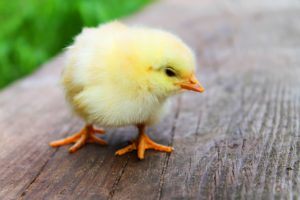3 Pets You Shouldn’t Adopt this Easter

As the Easter holiday rolls in, so does the season of jelly beans, egg hunts, and lilies. Unfortunately for many animals, it’s also the season for misguided purchases. Bunny, chick, and duckling sales skyrocket this time of year, but many of these animals are abandoned or neglected shortly after. No matter how traditional it may seem, chicks, ducklings, and bunnies don’t make good Easter presents. While they may be irresistible in the store, the reality of owning these pets can be quite different than anticipated.
The thought of a real live Easter Bunny as a gift might seem cute, but it’s a commitment that will last you long after Easter. Bunnies typically live anywhere between eight and twelve years and can require just as much work as a dog or cat.  If you aren’t willing or able to take on this responsibility, for the sake of the animal, it’s best to opt for a different Easter gift. On top of that, bunnies are fragile and can also be skittish at times. An inexperienced child could easily drop the rabbit, potentially causing quite a bit of harm. What seemed like a cute Easter present could actually end up injuring the animal and costing you a decent amount in veterinary expenses. If you aren’t prepared to care for a bunny the way you’d care for a puppy or kitten, Easter probably isn’t the time for you to bring one home. If you’re absolutely sure you’re prepared to take on the responsibility of a rabbit, check your local shelter before heading to the pet store. Many pet stores inhumanely mass produce bunnies at this time of year, while a perfectly healthy, loving rabbit could be waiting for you at the shelter.
If you aren’t willing or able to take on this responsibility, for the sake of the animal, it’s best to opt for a different Easter gift. On top of that, bunnies are fragile and can also be skittish at times. An inexperienced child could easily drop the rabbit, potentially causing quite a bit of harm. What seemed like a cute Easter present could actually end up injuring the animal and costing you a decent amount in veterinary expenses. If you aren’t prepared to care for a bunny the way you’d care for a puppy or kitten, Easter probably isn’t the time for you to bring one home. If you’re absolutely sure you’re prepared to take on the responsibility of a rabbit, check your local shelter before heading to the pet store. Many pet stores inhumanely mass produce bunnies at this time of year, while a perfectly healthy, loving rabbit could be waiting for you at the shelter.
Chicks and ducklings almost have it worse around Eastertime, as they’re often seen as more “disposable pets.” These birds will be cute and fuzzy for Easter, but will grow out of their adorable stage in just a couple weeks. When this happens, many  people find they don’t have the space to care for these animals anymore, or just simply aren’t interested in keeping a full grown bird around the house. It’s not uncommon for people to carelessly release chicks and ducklings into the wild where their chances of survival are pretty slim. Constant care is critical in the first few weeks of their lives, so you must also be well informed of all their needs before considering bringing one home. Additionally, if you’re adopting from a pet store rather than a reputable breeder, you run the risk of bringing salmonella into your home. Like bunnies, these animals are also incredibly fragile and could easily be harmed at the hands of a child just wanting to snuggle. Chicks and ducklings aren’t Easter gimmicks, they’re living creatures and deserve to be treated as such.
people find they don’t have the space to care for these animals anymore, or just simply aren’t interested in keeping a full grown bird around the house. It’s not uncommon for people to carelessly release chicks and ducklings into the wild where their chances of survival are pretty slim. Constant care is critical in the first few weeks of their lives, so you must also be well informed of all their needs before considering bringing one home. Additionally, if you’re adopting from a pet store rather than a reputable breeder, you run the risk of bringing salmonella into your home. Like bunnies, these animals are also incredibly fragile and could easily be harmed at the hands of a child just wanting to snuggle. Chicks and ducklings aren’t Easter gimmicks, they’re living creatures and deserve to be treated as such.
If you’re absolutely sure you’re ready, willing, and able to care for a chick, under no circumstances should you ever purchase a chick that has been dyed a bright or pastel color for the holiday. These dyes are harmful and painful to the animal’s skin, and the dying process is often inhumane as the animals are blasted with color against their will. Instead of dyed feathers, a simple colored ribbon on the chick’s basket will be just as festive without supporting a cruel industry.
There are many alternatives to live animals for Easter gifts—Peeps, chocolate bunnies, and cuddly stuffed animals, just to name a few. When an animal’s life is on the line, a spur of the moment gift isn’t a good idea. Before purchasing any pet, make absolutely sure you still have a place for them in your home and in your heart after the novelty has worn off. Easter is a time for renewal and growth, not a time for unintended harm to an Easter-themed animal.
